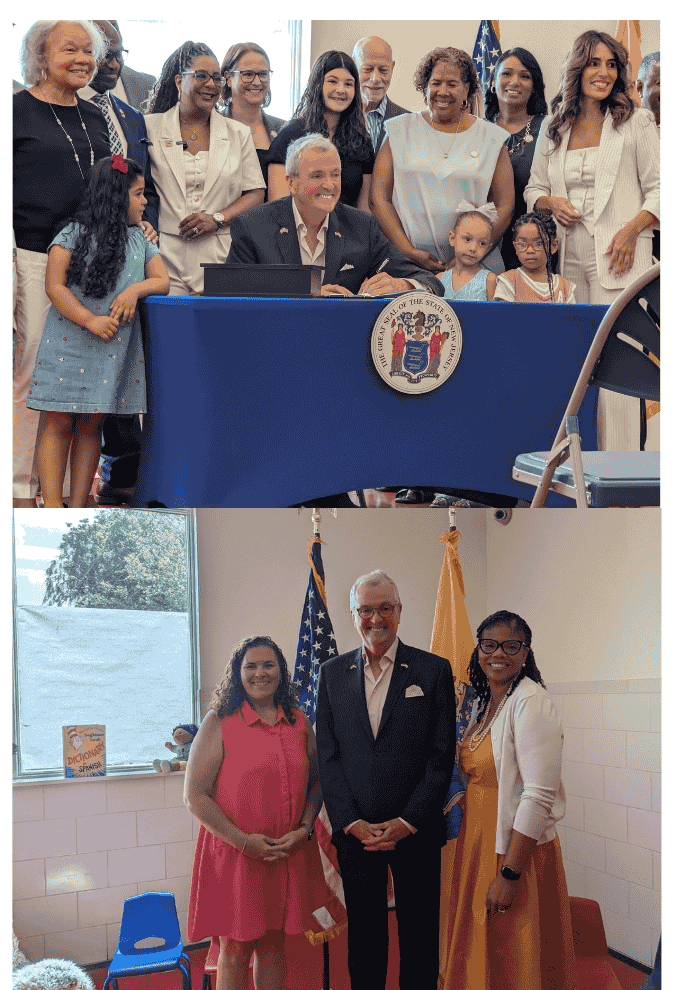Posted on July 11, 2025
UPDATE: New Jersey Universal Preschool
This week, Governor Murphy signed significant legislation expanding access to early education, addressing several policy priorities ACNJ has long advocated for, while also leaving areas of opportunity for further improvement.
The centerpiece legislation (S3910/A5717) codifies New Jersey's preschool funding formula into statute, strengthening and sustaining the state’s pre-K expansion effort, while also setting the course to provide full-day kindergarten by 2030. This represents the culmination of decades of advocacy, beginning with ACNJ’s involvement in the Abbott v. Burke Supreme Court decision more than 25 years ago, which mandated high-quality public preschool for children in high-poverty districts.
The other two bills include:
- The authorization of three-year contracts between school districts and community childcare providers, providing much-needed stability for community providers (S4476/A5780).
- Amendments to the Fiscal Year 2026 Appropriations Act, updating various language provisions concerning Preschool Education Aid to align with legislation (S3910/A5717) that modifies the allocation of Preschool Education Aid ( A5908/S4695).

Governor Phil Murphy signed significant legislation to expand access to early childhood education on July 11, 2025.
Key Provisions Aligned with ACNJ Priorities
- Ensuring Universal Preschool Expansion: The law codifies annual preschool expansion grants and revises preschool education aid requirements, providing the predictable investment our early learning system needs to thrive.
- Enhanced Stability for Providers: Recognizing that community-based providers are essential partners, the legislation extends contract terms from one to three years. Multi-year contracts makes it easier for providers to secure funding for facility upgrades and new program start-up costs, as well as planning. The previous one-year contract agreements created uncertainty about program continuation, not knowing if they would be renewed another year. Extended contract terms now offer the stability needed for meaningful facility investments and stronger partnerships.
- Comprehensive Coordination: The legislation also addresses the fragmentation ACNJ has long identified as a barrier to effective preschool delivery, improving coordination and transparency by:
-
- Establishing a Universal Preschool Implementation Steering Committee with representatives from key State agencies and the Legislature.
- Requiring the Departments of Education, Children and Families, and Human Services to maintain and annually update public information on preschool and child care providers.
- Mandating annual reports to the Legislature on the status of preschool education and the effectiveness of the mixed-delivery model.
- Directing State agencies to publish guidance on expanding access to high-quality preschool in high-need areas.
ACNJ thanks Governor Murphy for keeping his promise to expand early education to New Jersey’s youngest learners. Since taking office, 229 districts have been added to state-funded preschool programs. And more recently, in February 2025, the state announced that the Department of Education and Department of Children and Families would amend their rules to align state-funded and licensed child care centers to the same minimum space requirement of 42 square feet of usable space per child. This critical regulatory change, which ACNJ has long advocated for, removes a significant barrier that often prevented child care providers from participating in preschool expansion.
New Jersey’s public pre-K program is a nationally recognized model, demonstrating the profound impact of quality early education. Research by the National Institute for Early Education Research confirmed that students who attended Abbott preschools continued to excel through 10th grade, with a 15% reduction in grade retention and 7% decrease in special education placements.
Critical Gaps That Require Continued Attention
Although this legislation is a big step forward, the state can still do more to build a stronger, comprehensive early education system.
We know that a robust mixed-delivery model -public schools partnering with community child care centers- is essential to meeting the diverse needs of families. However, the legislation stops short of mandating it. Declining participation by private child care providers threatens the viability of the broader early care and education system. In former-Abbott districts, enrollment in the community decreased by 25% from 2009 to 2022, while in expansion districts, only 17% of preschoolers are served by private providers. The loss of preschool-aged children from community-based centers threatens the entire birth-to-five system by undermining the financial viability of infant and toddler care. This creates "infant toddler care deserts" that ultimately harm working families and the broader economy.
In addition, the legislation does not establish the pathways and timeframes to help existing early childhood educators meet the certification requirements, potentially exacerbating the teacher shortage crisis.
Conclusion
ACNJ commends Governor Murphy, Senate Majority Leader Ruiz, Assemblywoman Katz, and all the legislative sponsors for their leadership. As we work toward implementation, ACNJ remains committed to ensuring this legislation achieves its full potential by strengthening the mixed delivery system that serves as the backbone of quality early childhood education in New Jersey.
The promise of universal preschool is within reach. With continued advocacy and thoughtful implementation, New Jersey can build an early childhood system that truly serves all children and families.
For more information on this topic, contact Winifred at wsmith-jenkins@acnj.org.

